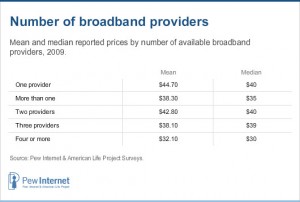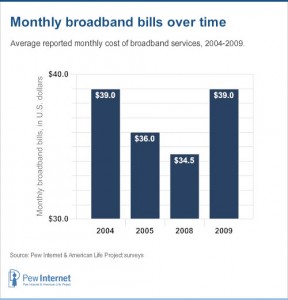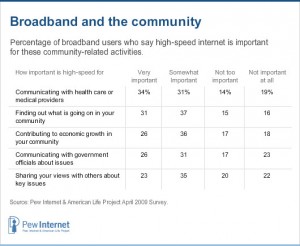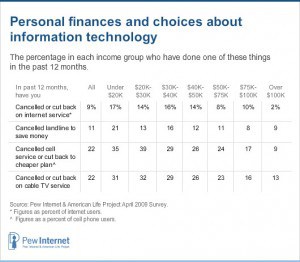Verizon FiOS, the fiber to the home service from “the phone company” in many areas around the country, today formally announced it was increasing broadband speeds for customers to provide them with better service. FiOS often provides the fastest Internet speeds in the markets they serve, prompting speed, service, and occasionally even price wars wherever Verizon competes with cable companies.
Verizon’s strong competition makes cable think twice about conducting Internet Overcharging experiments with talk of limits, tiers, and other anti-competitive, anti-consumer pricing.
“From its inception just five years ago, Verizon FiOS has transformed the American broadband and home-entertainment experience by delivering innovative services that our competitors can’t match,” said Mike Ritter, chief marketing officer for Verizon Telecom. “Today FiOS leaps forward again with faster two-way broadband speed options that free customers to fully participate in today’s interactive, multimedia Web.”
Verizon is doubling-to-quadrupling the upstream connection speeds and increasing the downstream connection speeds of its most popular FiOS Internet offerings. The company has raised the connection speed of its entry-level FiOS Internet service from 10/2 megabits per second (Mbps) to 15/5 Mbps, and has raised the connection speed of its flagship, mid-tier offering from 20/5 Mbps to 25/15 Mbps. In New York City, on Long Island and in other New York City suburbs, FiOS Internet is even faster with a new entry-level connection speed of 25/15 Mbps, and a new mid-tier offering of 35/20 Mbps, available only in bundles.
According to a survey of residential broadband users in the U.S. by the market intelligence firm In-Stat (“US Broadband Speeds on the Rise,” In-Stat, Feb. 2009), the average upstream connection speed used by cable broadband customers is 2.68 Mbps. Verizon is offering speeds two-to-seven times faster than this typical cable upload speed.
Verizon’s standard service plan offers new customers in many areas some dramatic improvements, leaving services like Time Warner Cable and Comcast in less competitive areas in the dust:
Verizon FiOS Standard Service (outside of NYC/Long Island) (was 10Mbps/2Mbps) is now 15Mbps/5Mbps
Time Warner Rochester Standard Service remains 10Mbps/384kbps
Price per month $45 (TWC charges $5 less if you are a cable customer)
Verizon FiOS (‘Faster’ Plan) (outside of NYC/Long Island) (was 20Mbps/5Mbps) is now 25Mbps/15Mbps
Time Warner Rochester Turbo Plan remains 15Mbps/1Mbps
Verizon plan is $65 per month, Time Warner Turbo is cheaper but has much slower upload speeds, and runs around $50 a month.
The new speeds are available to new customers or those existing customers who wish to upgrade to a new contract with Verizon (one year term commitments are common for FiOS). But customers who sign up for a bundle package of telephone, broadband, and video service will also receive a free Flip Ultra Camcorder or Compaq Mini Netbook.
Of course, where Verizon FiOS does not compete, expect more of the same from incumbent providers, who continue to contemplate ways to extract more money from customer’s wallets for the exact same, comparatively slow service.


 Subscribe
Subscribe




 When you boil it all down, sock puppets are people who feel morally fine with taking money for being willing to assume any position you want them to take. It’s vaguely familiar to another profession that’s been around for a very long time. One just has better office space than the other, and better business cards, too.
When you boil it all down, sock puppets are people who feel morally fine with taking money for being willing to assume any position you want them to take. It’s vaguely familiar to another profession that’s been around for a very long time. One just has better office space than the other, and better business cards, too.